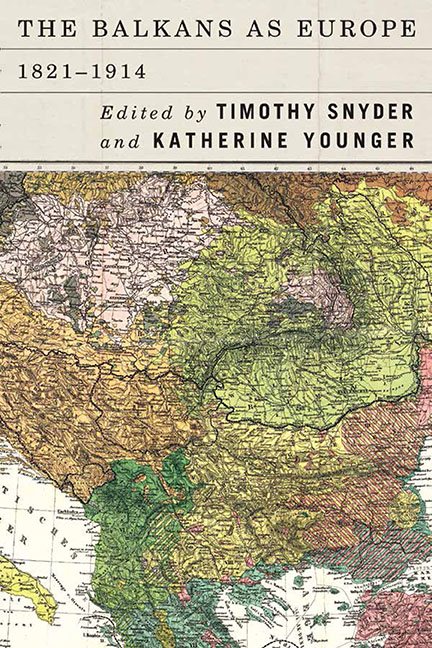Book contents
- Frontmatter
- Contents
- A Note on Terminology
- Maps
- Introduction
- 1 Balkan Initiatives to Make Europe: Two Cases from Mid-Nineteenth-Century Dalmatia
- 2 The Homeland as Terra Incognita: Geography and Bulgarian National Identity, 1830s–1870s
- 3 Liberation in Progress: Bulgarian Nationalism and Political Economy in a Balkan Perspective, 1878–1912
- 4 Emigrants and Countries of Origin: The Politics of Emigration in Southeastern Europe until the First World War
- 5 The Quiet Revolution: Consuls and the International System in the Nineteenth Century
- 6 The Hollow Crown: Civil and Military Relations during Serbia's “Golden Age,” 1903–1914
- List of Contributors
- Index
- Rochester Studies in East and Central Europe
Introduction
Published online by Cambridge University Press: 17 July 2019
- Frontmatter
- Contents
- A Note on Terminology
- Maps
- Introduction
- 1 Balkan Initiatives to Make Europe: Two Cases from Mid-Nineteenth-Century Dalmatia
- 2 The Homeland as Terra Incognita: Geography and Bulgarian National Identity, 1830s–1870s
- 3 Liberation in Progress: Bulgarian Nationalism and Political Economy in a Balkan Perspective, 1878–1912
- 4 Emigrants and Countries of Origin: The Politics of Emigration in Southeastern Europe until the First World War
- 5 The Quiet Revolution: Consuls and the International System in the Nineteenth Century
- 6 The Hollow Crown: Civil and Military Relations during Serbia's “Golden Age,” 1903–1914
- List of Contributors
- Index
- Rochester Studies in East and Central Europe
Summary
The Balkans are commonly associated with backwardness. Why not with forwardness? There are good reasons to see the region and its constituent states as precursors of events in western Europe. Although the region, in the modern period, was less industrialized than much of the rest of Europe, the politicians and publics of the Balkans contemplated and even anticipated larger political trends.
Although the honor of being the first nation-state is usually accorded to France, it is perhaps more just to treat Serbia and Greece as the first genuine nation-states. The political ideas of the early Balkan nation builders, especially among the Serbs, were not diluted by enlightened imperialism of the Napoleonic variety. The nation-states that emerged in the Balkans in the 1820s were a model for Europe, and then for the world, precisely because they were inherently adaptable and pluralistic. For example, Serbs did not propose that Serbian ideas were right for Europe and the world, but rather that what Serbs had done, others might do. The Greek model associated national revolution with both Romanticism and classicism, so that Europeans who supported Greeks against the Ottoman Empire could believe they were taking part in a universal project of liberation. These first Balkan unifications preceded the Italian and German ones by roughly half a century—hence our proposition that the historian studying European nation-states must start first with the Balkans and only then seek echoes farther west. The Italian unification, like the Greek, involved a confusion of the individual and the collective: The liberation of the nation was conceived as the liberation of a national person, principled and worthy of emulation. The German unification was more like the Serbian, its claims generally limited to those of power and folk, not universal principles. Later, in the 1920s, the Balkan model of statehood was applied throughout eastern Europe as a result of the settlements made following the First World War.
The national revolutions in the Balkans did not prejudge which nations were coherent and which would gain statehood, but they did provide a model, one that is known in other, non-European, historical settings as anti-imperial or anticolonial. The integration of Balkan nation-states, a process that began in the early nineteenth century, had to and did involve the disintegration of the Ottoman Empire.
- Type
- Chapter
- Information
- The Balkans as Europe, 1821–1914 , pp. 1 - 10Publisher: Boydell & BrewerPrint publication year: 2018



